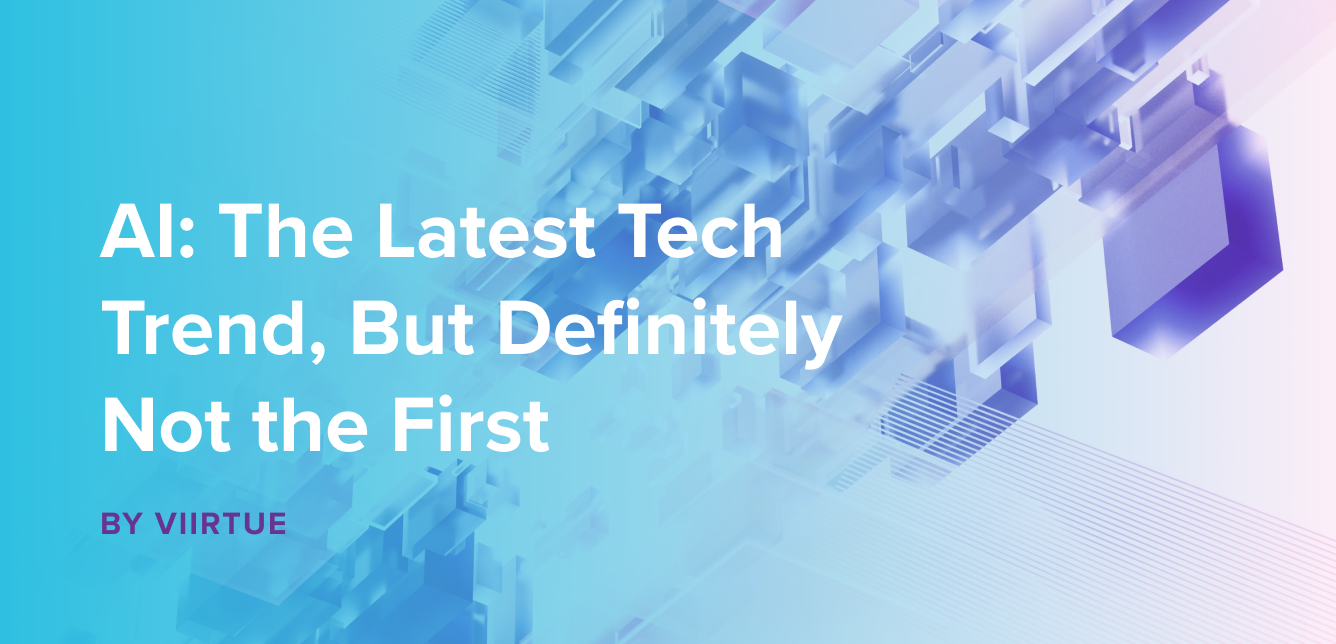In 2023, ChatGPT has undoubtedly become a sensation in the technology landscape. Artificial Intelligence (AI) is the current buzzword dominating the tech space, but it's not the only trend that has made waves in the past. Join us as we embark on a journey through time, exploring previous tech innovations and their lasting impact on the industry.
The world of technology is in a constant state of flux, with emerging trends shaping the way businesses operate and interact with their customers. Managed Service Providers (MSPs) play a crucial role in helping organizations navigate these technological advancements and harness their full potential. In this blog post, we will explore the impact of MSPs on some of the most significant tech trends over the past decade, including Big Data, IoT, AI, Conversational AI, and more. We will also discuss how MSPs can continue to drive innovation in these areas and offer valuable insights for businesses looking to stay ahead of the curve.
Bonus: Read all the way through or jump to my list of top 10 biggest tech buzzwords of the last 25 years.
The explosion of data generation and collection has made Big Data one of the most talked-about tech trends in recent years. MSPs have been instrumental in helping organizations effectively manage, store, and analyze vast amounts of structured and unstructured data. By offering customized solutions for data storage and management, MSPs enable businesses to unlock valuable insights, optimize processes, and make data-driven decisions.
Key takeaways for MSPs:
- Offer scalable and secure data storage solutions
- Provide advanced analytics tools for data processing and visualization
- Stay informed about the latest trends in data privacy and regulatory compliance

IoT has revolutionized the way devices and systems communicate, with billions of interconnected devices exchanging data across various industries. MSPs have played a critical role in driving the IoT revolution, offering comprehensive solutions that enable businesses to integrate IoT technologies into their operations. This has led to improved efficiency, reduced operational costs, and enhanced customer experiences.
Key takeaways for MSPs:
- Develop expertise in IoT security and privacy
- Offer end-to-end IoT solutions, including device management and data integration
- Stay updated on industry-specific IoT applications and use cases
AI has emerged as a powerful force in the world of technology, enabling machines to perform tasks that traditionally required human intelligence. MSPs have been at the forefront of the AI revolution, providing businesses with cutting-edge AI solutions across various industries. By offering AI-powered tools and services, MSPs help businesses streamline operations, enhance customer experiences, and drive innovation.
Key takeaways for MSPs:
- Develop expertise in machine learning, natural language processing, and computer vision
- Offer tailored AI solutions based on industry-specific requirements
- Stay informed about ethical considerations and regulatory frameworks surrounding AI
Conversational AI, a specialized application of AI, focuses on creating human-like conversational experiences through chatbots, virtual assistants, and customer support automation. MSPs have been pivotal in enabling businesses to adopt Conversational AI technologies, transforming customer interactions and improving overall satisfaction.
Key takeaways for MSPs:
- Provide easy-to-integrate Conversational AI solutions that enhance customer engagement
- Offer training and support for businesses adopting Conversational AI tools
- Stay updated on the latest advancements in natural language processing and understanding
What are the biggest success and failure stories related to these tech trends?
Success Story: Tesla (associated with IoT)
Tesla is a prime example of a company that has successfully leveraged the Internet of Things (IoT) to revolutionize the automotive industry. Founded by Elon Musk and others in 2003, Tesla's electric vehicles (EVs) are equipped with numerous sensors and embedded software that enable data collection and exchange. Tesla's IoT ecosystem enables remote software updates, advanced diagnostics, and a high level of vehicle connectivity. This has helped Tesla become a market leader in electric vehicles and has propelled the company to a multi-billion-dollar valuation.
Failure Story: Theranos (associated with Big Data)
Theranos, a now-defunct health technology company, was founded by Elizabeth Holmes in 2003 with the ambitious goal of revolutionizing the medical testing industry using Big Data and advanced analytics. The company claimed that its proprietary "Edison" machines could quickly and accurately analyze tiny blood samples for a wide range of medical tests, but these claims were later proven to be false. In 2015, the Wall Street Journal exposed the company's fraudulent practices, and by 2018, Theranos had dissolved. The failure of Theranos is often cited as a cautionary tale of the potential dangers associated with the hype and overpromising of technology capabilities.
10 Biggest Tech Buzzwords of the Last 25 Years (and if they succeeded)
-
World Wide Web (around 1990s): The global network of interconnected documents and resources that form the backbone of the internet. (Success)
-
E-commerce (around 1990s): The buying and selling of goods and services over the internet, which has revolutionized retail and commerce. (Success)
-
Y2K (late 1990s): The widespread fear that computers would malfunction when the calendar rolled over to January 1, 2000, due to issues with handling dates. Although a significant amount of time and resources were spent on addressing the potential problem, the overall impact was minimal. (Failure, in terms of the predicted disaster)
-
Peer-to-Peer (P2P) (around 2000s): A decentralized network architecture allowing direct sharing of files and resources between users without the need for a central server. While P2P technology has been successful in some applications, such as file sharing and cryptocurrency, it has also been associated with copyright infringement and illegal content sharing. (Mixed Success)
-
Cloud Computing (around 2000s): The delivery of computing services, such as storage, processing, and software, over the internet, allowing for increased flexibility and scalability. Cloud computing has become an integral part of modern IT infrastructure. (Success)
-
Social Media (around 2000s): Online platforms and applications that enable users to create and share content and engage in social networking. Social media has transformed communication, marketing, and information sharing but has also been associated with privacy concerns and the spread of misinformation. (Mixed Success)
-
Big Data (around 2010s): The collection, storage, and analysis of vast amounts of structured and unstructured data. Big Data has enabled businesses to gain insights and make data-driven decisions, but it has also raised concerns about data privacy and security. (Mixed Success)
-
Internet of Things (IoT) (around 2010s): The network of interconnected physical devices and objects embedded with sensors, software, and other technologies to collect and exchange data. IoT has led to numerous innovations and efficiencies across industries, but it has also introduced challenges related to security, privacy, and data management. (Mixed Success)
-
Artificial Intelligence (AI) (ongoing): Technologies that enable machines to perform tasks that typically require human intelligence. AI has had significant successes across various industries, but it has also raised concerns about job displacement, ethical issues, and potential biases in algorithms. (Mixed Success)
-
Blockchain (around 2010s): A decentralized, distributed ledger technology that enables secure, transparent, and tamper-proof recordkeeping for transactions. Blockchain has shown promise in various applications, particularly in finance and supply chain management, but it has yet to achieve widespread adoption and faces challenges related to scalability, energy consumption, and regulatory compliance. (Mixed Success)
As the technology landscape continues to evolve, MSPs will remain key players in helping businesses stay ahead of the curve and seize new opportunities. By developing expertise in emerging tech trends and offering comprehensive, tailored solutions, MSPs can ensure they remain valuable partners in their clients' journeys toward digital transformation. Keep an eye on the horizon, and stay informed about the latest developments in the ever-changing world of technology.

